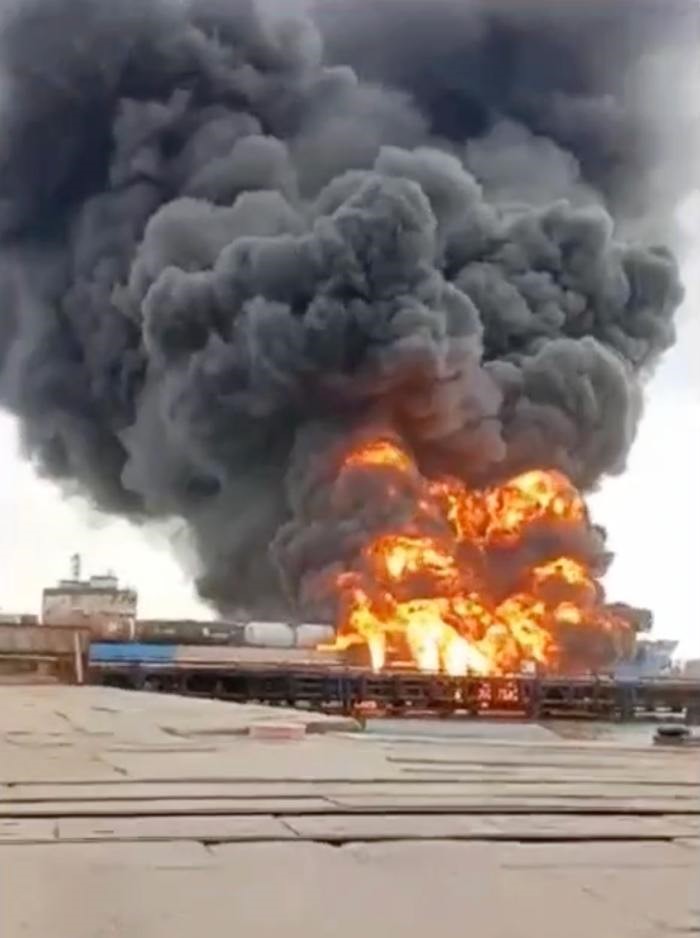The Ukrainian Navy has confirmed its responsibility for the attack on the Kavkaz port in the Kerch Strait on 22 August, which suggests the use of domestically produced Neptune missiles.
"The Navy destroyed a ferry in Port Kavkaz that was transporting fuel for the Russian armed forces. It was the last of the operational ferries," Ukrainian Navy spokesman Dmytro Pletenchuk told Suspilne Krym.
The attack resulted in the sinking of a railway ferry carrying fuel, significantly impacting Russian military logistics in occupied Crimea. Pletenchuk added that the Russians now have "one ferry under repair and another anchored in Azov [Sea]."
The strike has forced the temporary suspension of Russia's Kerch ferry service. Anatolii Tsurkin, the former "Minister of Transport" of occupied Crimea and current head of the Crimean freight carriers and forwarders association, announced on Telegram messenger:
"We ask carriers who previously used this route to move through the land corridor to Crimea," he wrote, urging the transporting companies to reach Crimea across occupied southern Donetsk and Zaporizhzhia Oblast, instead of using the Kerch Strait ferries.
Disruption of military logistics
In 2016-2019, Russia illegally constructed a bridge across the Kerch Strait, connecting the occupied Crimean Peninsula to Russia. The bridge became a critical route for supplying Russian forces in southern Ukraine during Russia's full-scale invasion that started in February 2022. In October 2022, a Ukrainian attack severely damaged both the rail and vehicle parts of the Kerch Bridge.
Although Russia repaired the bridge, the rail section suffered unrepairable structural deformation, leading to restrictions on heavy loads, with only light trains permitted to pass. Consequently, Russia shifted most of its rail-dependent military logistics to a backup option - its railway ferries operating between Russia's Port Kavkaz and occupied Kerch.
Media: Satellite images show Russia stopped using Kerch for military logistics in Ukraine
Ukraine has already targeted Port Kavkaz in May, damaging one of the ferries and an oil depot, then in July, damaging another ferry.
Now, Pletenchuk noted that the attack has exposed vulnerabilities in Russian supply lines to Crimea:
"The Russians do not dare to transport fuel on the Crimean Bridge railway line because they fear it won't withstand the load. They may use tank trucks for this purpose."
Neptune
The R-360 Neptune is a Ukrainian subsonic cruise missile with a 150 kg warhead, developed by the Luch Design Bureau in Kyiv as an anti-ship missile, later adapted for land attack. Initially, it had a range of over 200 kilometers, but the current specifications of the land-attack version are unknown.
Ukraine has reportedly been working on extending the missile's range to 1,000 km while increasing production tenfold. Although Ukraine has a limited production capacity for Neptunes, the Ukrainian leadership has repeatedly promised to boost funding for domestic missile programs.
Despite limited numbers, confirmed and claimed Neptune attacks are notorious. In April 2022, Ukrainian sources claimed to have damaged the Russian frigate Admiral Essen with Neptune missiles. Later the same month, two Neptunes sunk Russian Black Sea Fleet's flagship, cruiser Moskva. In 2023, several components of Russia's S-400 surface-to-air missile systems night have been destroyed with Neptune missiles.
In March 2024, Ukraine claimed to have struck the Kostiantyn Olshanskyi landing ship with a Neptune missile - the Russians seized the ship back in 2014 during the occupation of Crimea.
Later, various Ukrainian and Russian sources indicated that Ukraine deployed Neptune missiles in attacks on a navy ship in Sevastopol, another ferry in Port Kavkaz, a drone facility in Krasnodar Krai, and an ammunition warehouse in Kursk. Russian authorities also claimed to have shot down Neptunes on several other occasions.
Related:
- Fuel-laden ferry sinks in Russian port after alleged Ukrainian strike – Russian media
- Russia opens Mariupol railway, cutting logistics routes by 300 km
- Media: Satellite images show Russia stopped using Kerch for military logistics in Ukraine
- Drones hit Russian military unit, railway ferry used for matériel supply to occupied Crimea
- UK intel: Ukrainian strike on ferry at Kavkaz port will force Russia to carry fuel across Kerch bridge
- Ukrainian military severely damage Russian ferry Slavyanin in Kavkaz port
- Satellite images confirm strikes on Kursk aviation and artillery warehouses prior to incursion
- Romania partners with Ukraine to enhance Neptune missiles that destroyed Russian flagship Moskva
- Ukraine hits Russia’s Port Kavkaz, targeting oil terminal, ferry crossing
- Ukraine says it hit Russia’s stolen Ukrainian ship with Neptune missile in occupied Crimea
- Russians build alternative railways for military logistics in Ukraine’s occupied south

